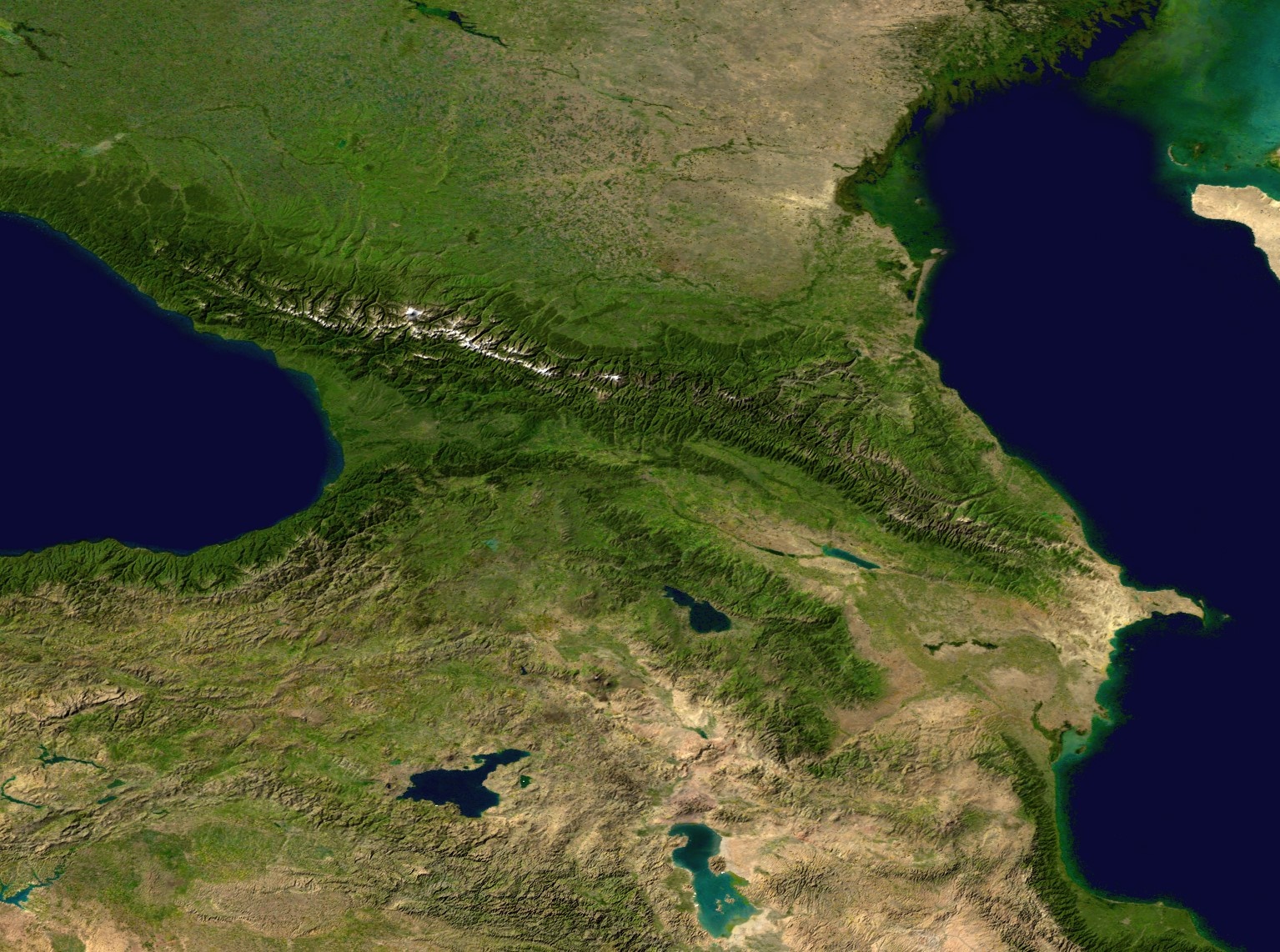Energy has played a central role in shaping the political dynamics of the South Caucasus, significantly shaping its geopolitical terrain. Historically, Azerbaijan’s hydrocarbon reserves and the region’s potential as a transit corridor for energy resources have attracted international interest, independent of the varied political models pursued by regional states. But there is far more to energy politics in the South Caucasus than pipelines and transit. The distribution of energy resources and infrastructure between the three South Caucasus states and their powerful neighbours – Russia, Turkey, and Iran – has created a web of complex relations among the South Caucasus countries and has been one of the key factors in shaping their relations with regional powers.
| Country | Oil and gas | Electricity |
| Armenia (landlocked) | Import dependent | Partially import dependent |
| Georgia (not landlocked) | Import dependent | Partially import dependent |
| Azerbaijan (landlocked) | Self-sufficient Net exporter | Self-sufficient |
Energy has proven critical in shaping the geopolitical reality of the South Caucasus region for several reasons. Firstly, it has served as a powerful tool of foreign policy, as evidenced by Azerbaijan’s strategic partnership with the EU and the United States in the energy domain. Conversely, Armenia and Georgia have found themselves in a position of dependence in energy diplomacy due to their reliance on Russia for energy supplies. Secondly, energy resources have created an economic power imbalance – notably demonstrated by Azerbaijan’s substantial oil revenues accumulated since the First Karabakh War – enabling it to establish a significant military advantage over Armenia. Finally, energy has been a deterrent in averting further military escalation, particularly evident in the conflict between Armenia and Azerbaijan.
In a country known for its history of human rights violations and limited political diversity, Azerbaijan has been left with only a few narratives to sustain its relations with Western countries. Among these, energy diplomacy has stood as the most crucial, while security cooperation has so far represented another significant factor. Azerbaijan has seized the opportunity presented by the EU’s efforts to reduce its reliance on Russian natural gas. It has successfully presented its westbound export pipelines as a key alternate source that circumvents the Russian Federation, a success that has eluded other oil and gas-rich countries in the Caspian basin such as Kazakhstan and Turkmenistan which lack direct energy links with the West. The Baku-Tbilisi-Ceyhan oil and Baku-Tbilisi-Erzurum natural gas export pipelines, followed by the recently completed transnational Southern Gas Corridor pipeline system, have enabled Azerbaijan to maintain solid relationships with the EU and the US, despite a lack of democratic reform. In parallel, Baku has also avoided provoking Russia, arguing that Azerbaijan’s export volumes are low compared to Russian exports to Europe – around 200 billion cubic meters vs 10 billion cubic meters.
Energy dependence has been one of the key factors in Armenia and Georgia’s interaction with Russia. Armenia’s full reliance and Georgia’s partial reliance on Russian gas and electricity have been critical in shaping the relations between these South Caucasus states and their giant northern neighbour. Russia, renowned for its historical use of energy as a tool, has not recently chosen to overtly employ it in its relations with the South Caucasus states; there has been no repeat of 2006 when Russia cut off gas to Georgia, leading to an energy crisis. The Kremlin has, however, used its leverage against Georgia’s breakaway region of Abkhazia, when the de facto state faced rolling blackouts and it demanded political concessions in exchange for electricity.
Russia and Armenia
Armenia’s reliance on Russia for its natural gas supply has played a pivotal role in shaping the country’s economic and political ties with its neighbour. Unlike Georgia, Armenia has been unable to diversify its gas imports using supplies from Azerbaijan due to the conflict between the two countries. Consequently, this situation has led to the further dependence of Armenia on Russia, not only in natural gas imports but also in granting Russia leverage over the country’s domestic natural gas infrastructure. Armenia’s failure to pay its debts to Russia for natural gas imports has eventually led to the full monopolisation of Armenia’s domestic natural gas infrastructure (including transportation and distribution) by Russia’s Gazprom. As a result, Gazprom has fully owned Armgazprom for the last ten years since the company bought the remaining 20% of the Armenian state’s shares in the company in exchange for a lower gas price. Additionally, Russia used natural gas prices to secure Armenia’s membership in the Eurasian Economic Union. Russia has also effectively used the Metsamor nuclear power plant as a means of gaining leverage against Armenia. This power plant has played a critical role in Armenia’s power generation, accounting for anywhere between 25% and 40% of its power mix at different periods. Armenia’s lack of affordable alternatives has left the country with limited choices for replacing the outdated power station. Moscow wasted no time in capitalising on this situation, advocating for an extension of the lifespan of the nuclear power plant until 2036. In 2021, Rosatom successfully repaired and enhanced the plant, ensuring its operation until 2026. Furthermore, Rosatom remains a top contender for the construction of a new nuclear power plant in Armenia after 2036.
Russia and Georgia
Unlike Armenia, Georgia has avoided becoming heavily dependent on energy imports from Russia. This was possible primarily due to the availability of alternative energy sources from Azerbaijan, Turkey, and Iran. Nevertheless, Russia continues to exert significant influence over Georgia’s electricity infrastructure, particularly through participation in the country’s electricity transmission and distribution system. Georgia’s sole transmission system operator, GSE, is a 50/50 joint venture between the Georgian Government and Russia’s Inter Rao, which is also a 75% owner of Silk Road Holdings BV – one of two distribution system operators in the country.
Energy and the Armenia-Azerbaijan conflict
In over 30 years of conflict with Armenia, Azerbaijan successfully employed its energy resources to achieve its political and military objectives. By capitalising on the revenues generated from energy exports, Azerbaijan established a significant economic and military advantage over Armenia, culminating in a decisive victory for Azerbaijan in the Second Karabakh War. Additionally, Azerbaijan leveraged its role as a key alternative source of energy for Europe to forge alliances with Western nations and key partners, such as within the United Kingdom (BP) and with Israel. While Israel has openly offered political and military assistance to Azerbaijan, the UK has been cautious about appearing biased towards Azerbaijan. However, there are cases in which Azerbaijan was arguably given favourable treatment by the UK due to its close energy relationship and BP’s investment. In September 2023, the UK obstructed a UN Security Council resolution that denounced Azerbaijan’s treatment of ethnic Armenians in Nagorno Karabakh.
Occasionally, Azerbaijan has also employed its energy infrastructure, including offshore platforms and underground pipelines, as a means to discourage geopolitical and military escalation. An early example took place in 2001, when Azerbaijan accused Iran of jeopardizing the oil exploration work of a BP-led consortium in its offshore waters. By diplomatically alerting the international community to the potential risks posed to its crucial infrastructure, Azerbaijan successfully dissuaded Iran from taking further action.
Opportunities and risks
Tectonic shifts have occurred in the South Caucasus and its immediate neighbourhood that are expected to have a profound impact on the political landscape of the region. The revolution in Armenia in 2018 – leading to a geopolitical reorientation towards the West – along with the Second Karabakh war, ongoing peace talks, and Georgia’s stuttering pursuit of EU membership, will all play a crucial role in shaping the future of the region. Energy security will be a key aspect that will present both possibilities and challenges for the future of the region.
Armenia’s nascent pivot towards the West largely depends on energy security. To maintain flexibility in its strategic political decisions, Armenia must decrease its dependence on Russia and seek alternative energy sources. The promised support of the EU and the US is crucial in this endeavour. However, the West is not in a position to bring short-term solutions to the problem. If peace talks are successful, Armenia may have the opportunity to import oil, gas and electricity from Azerbaijan which will certainly lessen Armenia’s dependence on Russia and contribute to a mutually beneficial partnership that could foster stability in relations between the two countries.
References:
- The Southern Gas Corridor: https://www.sgc.az/
- Baku-Tbilisi-Ceyhan pipeline: Baku-Tbilisi-Ceyhan pipeline | Who we are | Home (bp.com)
- Baku-Tbilisi-Erzurum pipeline: South Caucasus Pipeline | Who we are | Home (bp.com)
- Gazprom increases its stake in ArmRosGazprom to 100% – Business & Economy – TASS
- Russia to revamp Armenia’s nuclear power plant | Eurasianet
- Energy security – Georgia energy profile – Analysis – IEA
- georgias-energy-dependency-review-b.pdf (eprc.ge)
- Revealed: the UK’s business links to Nagorno-Karabakh | openDemocracy
- Iran Is Accused of Threatening Research Vessel in Caspian Sea – The New York Times (nytimes.com)
This blog is published in partnership with the Democratic Security Institute (DSI) based in Tbilisi, Georgia. It is part of a series of blogs authored by fellows from DSI’s Eurasia Democratic Security Network (EDSN) on the interrelationship between democracy and security in Europe’s eastern neighbourhood. EDSN is supported by the US National Endowment for Democracy (NED)
Rauf Mammadov is a senior manager at Fuld & Company, specializing in energy issues. He also serves as a non-resident scholar on energy policy at the Middle East Institute and the Jamestown Foundation.

